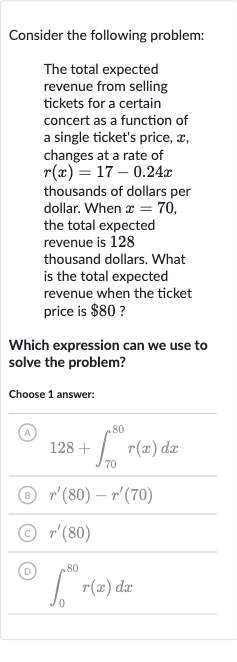AI tutor
Welcome to Bytelearn!
Let’s check out your problem:

Consider the following problem:The total expected revenue from selling tickets for a certain concert as a function of a single ticket's price, , changes at a rate of thousands of dollars per dollar. When , the total expected revenue is thousand dollars. What is the total expected revenue when the ticket price is ?Which expression can we use to solve the problem?Choose answer:(A) (B) (C) (D)
Full solution
Q. Consider the following problem:The total expected revenue from selling tickets for a certain concert as a function of a single ticket's price, , changes at a rate of thousands of dollars per dollar. When , the total expected revenue is thousand dollars. What is the total expected revenue when the ticket price is ?Which expression can we use to solve the problem?Choose answer:(A) (B) (C) (D)
- Calculate Change in Revenue: To find the total expected revenue when the ticket price is , we need to calculate the change in revenue from when the ticket price was to when it is . The rate of change of the revenue function, , is given as a function of the ticket price . To find the change in revenue, we integrate the rate of change from the initial price to the final price.
- Use Integral of Rate of Change: The correct expression to use for this calculation is the integral of the rate of change function, , from the initial price of to the final price of . This is because the integral of a rate of change function gives us the total change in the function over the interval.
- Expression for Total Change: The expression that represents the total change in revenue from a ticket price of \(70\) to is the integral of r(x) from to . This is represented by the expression . This means we add the change in revenue to the initial revenue of thousand dollars.
- Calculate Integral of r(x): Now we need to calculate the integral of r(x) from to . The function r(x) is given by . We integrate this function from to .
- Evaluate Antiderivative at Limits: The integral of from to is calculated as follows:
- Perform Calculations: We evaluate the antiderivative at the upper and lower limits of the integral:
- Simplify Calculations: Performing the calculations, we get:
- Find Change in Revenue: Simplifying the calculations, we find:
- Identify Mistake: Further simplifying, we get:
- Recalculate Change: Subtracting the two values, we find a change in revenue of:This result indicates a decrease in revenue of thousand dollars when the ticket price increases from \(70\) to .
- Recalculate Change: Subtracting the two values, we find a change in revenue of:This result indicates a decrease in revenue of thousand dollars when the ticket price increases from \(70\) to .However, this result does not make sense because the integral should give us a positive change in revenue since we are adding to the initial revenue. There must be a mistake in the calculation. Let's recheck the calculations.
